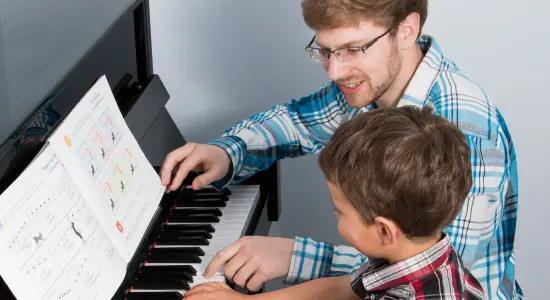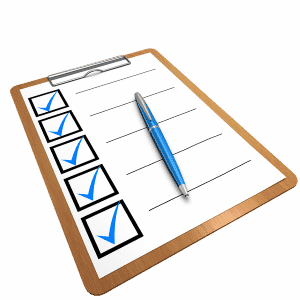
Choosing the right music teacher can make the difference between musical success and failure…
but how do you find a good teacher?
We want someone who will inspire and motivate us while equipping us with everything we need for a lifetime of musical joy and excellence…
In this article I will walk you through the process of finding good music teachers in your local area, and I’ll teach you everything you need to know to find the right instructor for you or your child.

First, begin by making a list of all the music teachers in your area that provide lessons on the instrument you’re interested in. This can be accomplished by doing some quick Google searches. I recommend something like “piano lessons near me” or “music teachers” followed by the name of your town or region.
You will likely receive three types of results from this search. At the very top of the Google results you will see paid advertisements. These look almost identical to normal results, but you will notice the word “Ad” in a green box under the heading. Below the ads you will see the local business results. They are shown with pin-point markers on a map of your city and a table of the 3 to 6 most popular businesses. Finally, you will find the more familiar “organic search results” below that.
Make a list of all businesses and teachers in the local and organic search results. I recommend skipping the paid advertisements as they are typically out of town online teachers or national directory services.
First, I would look for reviews to narrow your list. The Google local business search results will often have reviews. Also try searching other online directories such as Yelp, Yahoo, Bing, Yellowpages, and Superpages. Read reviews carefully, not all reviews are accurate. Good and bad reviews need to be specific and unbiased to validate their opinion. Some good reviews are obviously from biased sources like friends and family, and some bad reviews are the result of confusion and/or emotional flare ups.

Ask around for recommendations for good music teachers. In addition to friends and family, ask school teachers, music stores, and people you respect. Ask people specifically why they recommend or don’t recommend certain teachers. Be discerning with the information you receive.
Narrow your list further by visiting the websites of local music teachers. Music academies and teachers should provide more than just a sales pitch on their website. You should find specific information about what and how they teach, their experience and credentials, and their teaching philosophy and values.
I highly recommend scheduling a meeting with prospective music teachers before signing up for lessons. This is especially important if you didn’t come across many quality recommendations, or if you’re having trouble narrowing down your list of local teachers. Most good music teachers will happily accommodate your request to meet.

There are many qualities that music teachers must have if they are going to be effective and inspirational. A great musician does not necessarily make a great music teacher.
A good teacher is concerned only with their student and his or her needs, and not their own reputation. This is a big deal. I can’t tell you how many music students I’ve met with stories of their teacher openly expressing concern for themselves at the student’s expense. For example, “My teacher cancelled my performance in the recital because she said I might damage her reputation.”
A music teacher should have significant music education and teaching experience. Music teachers with no formal music education have become common place. This typically results in students being taught to play music exclusively by rote. With no musical backbone, these students tend to loose interest in music and/or never progress beyond a beginner level. That being said, having a teacher with a doctorate in classical piano repertoire will not make a difference in an 8 year-old’s piano lessons.
The vast majority of music instructors I know teach the same curriculum to all their students. This can work really well for some music students and not well at all for others. It is a teacher’s job to develop a plan for each individual student. This requires them to get to know and understand their student, and adapt their methods and approach accordingly.
A great musician is not always a great music teacher. Teachers are born, not made. And so it’s entirely possible that a teacher with little experience could still be an incredible teacher. But it’s also possible that they are mediocre or maybe even a terrible teacher. I recommend finding a teacher with at least 3 years experience as most terrible teachers don’t last that long.
Another advantage to finding someone with experience is the wisdom that comes with it. Teachers can develop incredible intuition over time that allows them to make critical, game-changing decisions that can have profound repercussions for their students.
Certifications show appreciation and dedication to the discipline of music teaching. To achieve certifications the teacher typically has to commit additional time and money to their profession.
I don’t recommend you make a big deal about associations. Typically anyone can join an association of music teachers. And some, like the Music Teachers National Association, encourage teachers to take a rigid and dry approach to music teaching. This sort of environment can strip fun and creativity from the musical experience.
Simply put, some people you click with and some you don’t. An amazingly gifted music teacher will not work well with everyone. After your meeting with a prospective instructor rate your gut feeling on a scale between 1 and 10. And don’t bother justifying your opinion.

I’ve taught quite a few students who came to my studio already burnt out on music lessons, but were willing to give it one more try. I can’t say all of them were inspired and became musicians. But I can say that most of them did! Most just needed a different approach, a faster or slower pace, an opportunity to explore different styles of music, and a teacher who took the time to understand the way they think and learn.
It’s true, choosing the right music teacher can make all the difference. In all likelihood you will be spending many years learning from this person. It makes sense to spend a month choosing your music teacher. And keep in mind, your decision does not have to be final. If it doesn’t seem to be what you hoped for, try a different teacher. In the end you will venture out into the world of music with a good command of musicianship–in all it’s many facets.